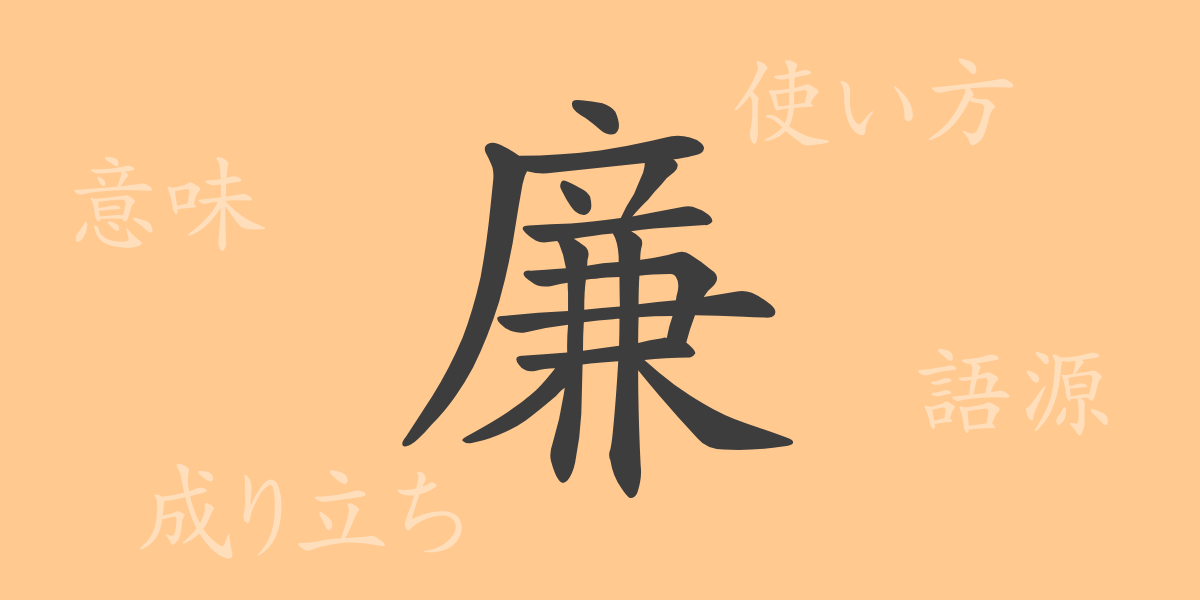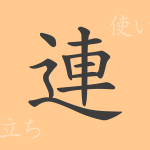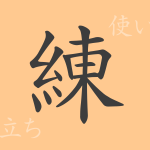Japanese kanji (かんじ) are known for their rich shapes and meanings. Each character carries a history and story that reflect the depth of Japanese culture. This time, we spotlight the 常用漢字 (じょうようかんじ, commonly used kanji) “廉” (れん, ren), delving into its origins, meanings, usage, as well as related idioms and phrases. Through this article, we hope you discover the unique charm of “廉” (れん, ren) and find it useful in your daily life.
The Origin of 廉 (れん, Ren)
The kanji “廉” (れん, ren) traces its origins back to ancient Chinese script, specifically 篆書 (てんしょ, tensho). In 篆書 (てんしょ, tensho), “廉” (れん, ren) combines “广” (まだれ, madare), which represents a roof, and “兼” (けん, ken), which signifies a beautiful jade. This combination originally meant “to cut beautiful jade under a roof,” which later evolved to imply “acting with a pure and honest heart.” Additionally, in terms like “廉価” (れんか, renka), the character “廉” (れん, ren) carries the connotation of being low-priced yet valuable.
Meaning and Usage of 廉 (れん, Ren)
“廉” (れん, ren) is primarily used in the form “清廉” (せいれん, seiren), meaning “honest and free from selfish desires.” It is often used to describe the character of individuals in public service or politics. Additionally, “廉価” (れんか, renka) refers to “low price” and is frequently used in economic contexts. Moreover, “廉” (れん, ren) appears in various idioms and phrases, such as “清廉潔白” (せいれんけっぱく, seirenkeppaku) and “廉恥” (れんち, renchi), each conveying the notion of integrity and modesty.
Reading, Stroke Count, and Radical of 廉 (れん, Ren)
The kanji “廉” (れん, ren) has the following characteristics:
- Reading: The 音読み (おんよみ, onyomi) is “れん” (ren), and there is no specific 訓読み (くんよみ, kunyomi).
- Stroke count: It has a total of 13 strokes.
- Radical: The radical is “广” (まだれ, madare).
Idioms, Phrases, and Proverbs Using 廉 (れん, Ren) and Their Meanings
Here are some idioms, phrases, and proverbs that include “廉” (れん, ren):
- 清廉潔白 (せいれんけっぱく, seirenkeppaku): Extremely honest and upright, without pursuing personal gain.
- 廉恥心 (れんちしん, renchishin): A sense of shame or modesty, striving to maintain dignity.
- 廉価 (れんか, renka): Low price.
- 廉頗藺相如 (れんぱりんそうじょ, renparinsoujo): A reference from a Chinese story, symbolizing mutual recognition and respect.
Summary of 廉 (れん, Ren)
The kanji “廉” (れん, ren) represents the profound nature of the Japanese language through both its form and meaning. It is used in various everyday contexts, such as praising an upright person or referring to a low-priced product. We hope this article deepens your understanding of the kanji “廉” (れん, ren) and enriches your knowledge of the language. Each kanji has its own story, and “廉” (れん, ren) continues to live on in our words, carrying its historical significance.

























